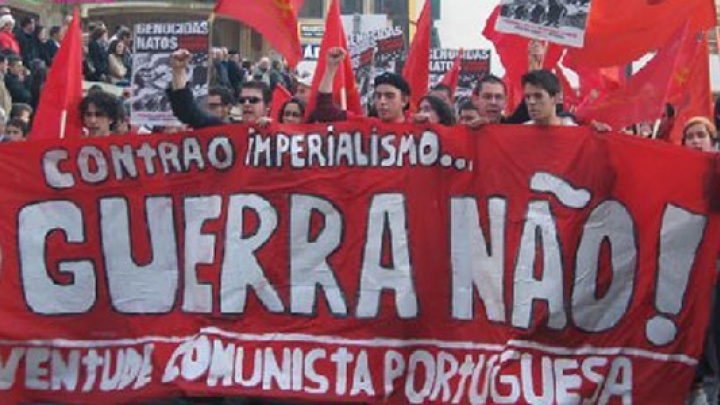Translated article by Angelo Alves, member of the Political Committee and of the International Department
Imperialist rhetoric and the “mediatised tent”, set up round Libya, brings one back to March 1999, when the NATO aggression to Yugoslavia took place, resulting in the dismantlement of the Yugoslavia federation, a great number of crimes against that people, which even currently, affect those populations together with the USA’s and NATO’s military bases and protectorates instalment, within the region.
The events’ progress demonstrates one is before a great danger and a similar imperialist strategy and therefore, a very different situation from that of the popular rebellions in Egypt, Tunisia, Bahrain, Yemen, among others. It is obvious that part of the Libyan population does not anymore consider Kadhafi and his,l clan unification” regime - the same one which ( and mainly after 1993) resumed the IMF’s structural adjustment programmes and its privatization policy; the important business with the main imperialist powers and Bush’s “ anti-terrorism war”. But there are also data which indicate the existence of sectors which support the current regime, both from the political, military and popular point of view.
In other words , one is before an home conflict in progress, within a country with very particular conditions and in which the clans, and their access to armament, were decisive for the.conflict having rapidly slipped unto an internal military conflict, together with the terrible consequences it brings. Therefore, one is not before a “terrible massacre” of civilians perpetrated by “ a mad dictator“, who commands his air force to “bomb disarmed civilians”, as the imperialist media tries to pass on, the perfect scenery to tread over again the “ humanitarian interference” fake.
And therefore,one is before a situation which ought to demand from a genuine “international community”, diplomatic and political support actions for the contention and peaceful resolution of the conflict in the strict respect for Libya’s independence, sovereignty and territorial integrity. Reality is exactly the opposite. The bellicose and open interference option has been decided and to prove it are Ban Ki Moon’s statements ( which in Fidel de Castro’s words “poured a considerable amount of fuel on fire”) and the USA’s, NATO’s and the European Union’s answer to any of the conflict’s political mediation attempts - such as Venezuela’s proposal accepted by Kadhafi - and “ bombarded”, in hast, by imperialism’s propaganda and rhetoric.
If there were any doubts about that option, the Dutch soldiers’, capture by Kadhafi’s loyal forces as well as the British, by the rebels themselves, they would be removed. These two events are both a proof of NATO’s and the main powers’ strategy: develop, within an internal conflict framework, an illegal and criminal interference action, espionage, incitement, some of the rebellion sectors’ training and armament, creation of the “humanitarian chaos” within the country and , in the end, opening up the path to the great purpose: military interference and domain over that huge territory.
Nevertheless, there are important factors which can stop imperialism’s strategy: 1- The popular masses, in progress, within the Arab world and their genuine anti-imperialist feelings; 2- China’s and Russia’s position within the United Nations Security Counsel, contrary to an aggression towards Libya; 3- and probably the most important: all the people of Libya’s real feeling for national independence ( both from the regime and rebels) well expressed in the rebels’ successive statements against a foreign military interference on the Libyan conflict.
Throughout the world, it is the peoples’ duty, including the Portuguese, to develop wide mass opinion movements, which express their frontal opposition to an aggression unto Libya, therefore, opening the ground and space to those who haven’t yet given up a negotiation towards a political and peace solution. In the name of the people of Libya !


